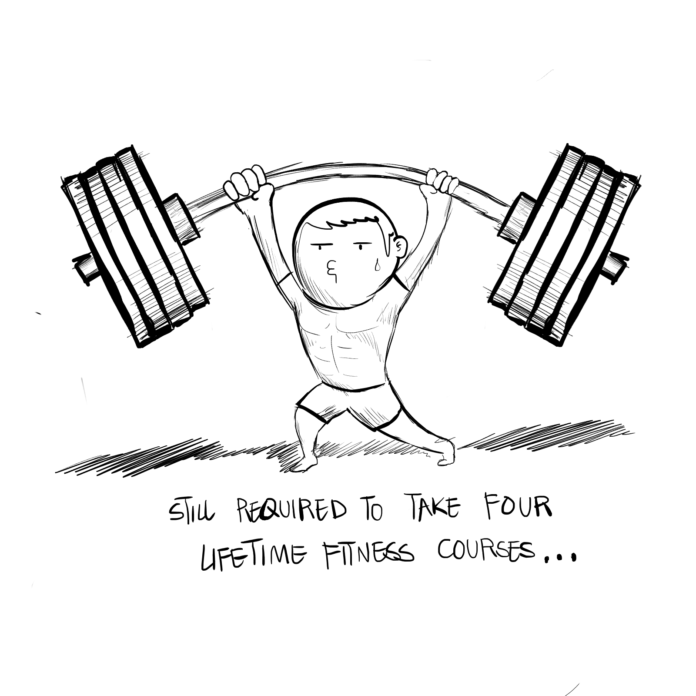If you look on the Major Academic Planner (MAP) for a B.A. in journalism, it lists of four required courses under the category of lifetime fitness. According to Baylor University’s department of Health, Human Performance and Recreation, “The purpose of the Division of Lifetime Fitness for non-major students is to provide health education, physical fitness education, and recreation education activities that will provide mental, physical, social, and leisure time preparation for lifetime fitness for all students.”
However, while lifetime fitness is meant to be an outlet for students to de-stress and take some time to focus on being healthy, for most it just adds unnecessary stress to an already hectic schedule.
First, it takes up several schedule blocks that students may need in order to complete their major in a reasonable amount of time. Four classes of lifetime fitness spread out over eight semesters may seem fairly achievable, but let’s look at the math. The average bachelor of arts major must take a minimum of 124 credit hours, which adds up to roughly 40 general education and major specific classes, not counting the lifetime fitness courses. While this may seem like a reasonable number, many students also carry a minor or are in an advanced track for their major. Adding extra classes into our schedule, ones that are not immediately connected to our degree plan, seems like an added burden.
If lifetime fitnesses were purely based off of class attendance and participation, perhaps it would not be so intrusive to students’ schedules. However, many lifetime fitnesses are not focused on mental, physical or social relaxation for students. The classes themselves have required assignments, lectures and even tests. For a pre-med student who is already spending hours studying for biology, organic chemistry and anatomy, taking valuable time to study for a relaxation test seems utterly ridiculous. These superfluous tests not only waste students’ time, but they can also impact students’ transcripts negatively if they do not do well. If Baylor wants to keep lifetime fitnesses as a part of their basic course load, at least take out required examinations.
For some programs such as BIC, students get credits for lifetime fitness courses. However, if a student is a double major, many times they are still required to take the courses, even though they are taking just as many classes (if not more) than BIC students. Allowing for alternative courses that align with the majors to replace lifetime fitness credits would be a viable alternative for students on a time crunch.
Not only that, but many students are involved in club sports or athletics, and they are still required to take lifetime fitnesses. Students on the Baylor Crew team wake up at 5 a.m. and practice for two hours. This doesn’t include the time they spend competing, which can last for up to two days. Students who are staying this active shouldn’t be required to take extra classes just to fulfill a requirement.
Baylor is full of active, involved and committed students. Requiring them to take lifetime fitnesses purely because it is supposed to encourage healthy lifestyles seems like a good idea, but it can end up doing more harm than good for students who are trying to graduate with difficult and time-intensive degrees. Offering alternative credit hours to students who need the time for their majors, or accepting club sports as fulfillment of the standard, would allow students to de-stress and actually enjoy their activities.
For students that find lifetime fitnesses useful, continue to encourage their participation, but don’t deny others the ability to make our four years as productive as possible.






